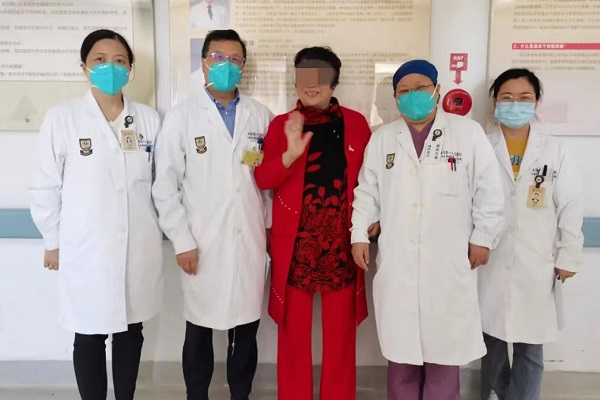- News
Precise Full-cycle Management Allows Hematopoietic Stem Cell Transplantation to Break the “Age Limit"
Link of the Original Article:
http://https://wap.xinmin.cn/content/32271877.html

When Ms. Cheng in a red coat came to the hematology ward of Songjiang Campus of Shanghai General Hospital again for a follow-up check one year after transplantation, all the doctors and nurses were happy for her. Ms. Cheng's complete blood count, bone marrow test were normal, and her bone marrow showed complete donor chimerism, which means she has obtained a new life through "haplo-identical allogeneic hematopoietic stem cell transplantation". Since successful hemopoietic stem cell transplant for a 67-year-old man in 2017, the hematologists of Shanghai General Hospital have repeatedly broken the age limit for hematopoietic stem cell transplantation with precise full- cycle management.
One and a half year ago, Ms. Cheng was diagnosed with acute myeloid leukemia. After several cycles of chemotherapy, she did not response well, and was diagnosed with refractory leukemia. The only curative procedure for her was salvage allogeneic stem cell transplantation. However, Ms Cheng was a 68 years old lady, and complicated with heart diseases and pulmonary hypertension. The transplant procedure was full of uncertainty for her.
On October 28, 2021, Ms. Cheng, came to the Department of Hematology of Songjiang Campusof Shanghai General Hospital for salvage transplant.
Professor Song Xianmin, Director of Department of Hematology, and Professor Wan Liping, Executive Director of Department of Hematology (South) made full preparations for Ms. Cheng's transplant procedure. On the one hand, multidisciplinary consultation was held to accurately assess the patient’s condition and prepared emergency plans to deal with possible severe complications. On November 16, 2021, Ms. Cheng's son, her haplo-identical donor, donated peripheral hematopoietic stem cellsto the patient.
A few days after transplant, Ms. Cheng developed lung infection withmultidrug-resistant bacterial , which caused persistant high fever. Prof. Wan Liping's team treated the patient with sensitive antibiotics for her multidrug-resistant bacterial infections ;At the same time, the team closely monitored the patient's cardiopulmonary, hepatic and renal functions throughout the transplantation process. Two weeks later, Ms. Cheng's neutrophil and platelet cell counts returned to normal, and her bone marrow test showed that leukemic cells disappeared, and normal hematopoietic cells from donor engrafted successfully.
After discharged from the hospital, Ms. Cheng was followed-up regularly at the outpatient department. She had blood and bone marrow test regularly, and was instructed for her medication adjustment at clinic. Ms. Cheng’s appetite gradually recovered and she became more dynamic. Today, one year after transplant, Ms. Cheng returned to normal life enjoyed happy life with her family.
Prof. Wan Liping said most people presumed leukemia was more common in children and young adults. in fact, the incidence of leukemia was significantly higher in elderly people. According to statistics, patients aged over 60 years account for more than 70% of all patients, including acute myeloid leukemia and myelodysplastic syndrome. Traditionally, it was believed that patients aged over 60 years old were not suitable for allogeneic transplant, however, with improvements in transplantatprocedure and development of new regimens, the age limit for transplant is constantly being broken.
"The survival of elderly patients with leukemia treated withr conventional chemotherapy is very poor, less than 10% patients could survive, while the overall survival of elderly patients with leukemia after receiving allogeneic hematopoietic stem cell transplantation could reach to 60%." Prof. Song Xianmin said. Today, age is no longer a limitation for stem cell transplantation. Elderly patients with acute leukemia could receive allogeneic stem cell transplantation with personalized regimen after comprehensive medical examination and evaluation, and have chance to achieve leukemia free life in the future.
Correspondent: Yan Zuo
